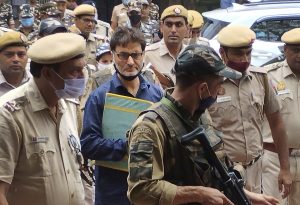A special court in New Delhi sentenced Kashmiri separatist leader Yasin Malik to life imprisonment last week after finding him guilty of funding terrorism and secessionist activities that rocked the Kashmir Valley in 2017.
The National Investigation Agency demanded the maximum punishment, the death penalty, to be handed to Malik. The court gave him two life sentences and five 10-year jail terms, all to be served concurrently.
Malik had earlier pleaded guilty of all charges, including those under the Unlawful Activities (Prevention) Act (UAPA). “If seeking Azadi (freedom) is a crime, then I am ready to accept this crime and its consequences,” Malik told the court. Legal experts say that Malik can appeal in the Delhi High Court against the sentence, but not his conviction.
Fifty-six-year-old Malik heads the banned Jammu and Kashmir Liberation Front (JKLF), whose goal is full independence for Jammu and Kashmir, including all territories under Indian and Pakistani control.
Disillusioned with democracy after witnessing from close quarters the rigging of the 1987 elections in J&K, Malik crossed the Line of Control into Pakistani Kashmir for weapons training. In 1989, Rubaiyya Saeed, daughter of the then Home Minister Mufti Mohammed Saeed, was kidnapped by the JKLF. Rubaiyya was subsequently freed in exchange for the release of five JKLF militants then in jail.
India’s abject surrender to the JKLF boosted Malik’s stature in J&K and provided a shot in the arm to the then incipient anti-India insurgency. Months later, Malik grabbed the media spotlight again when he and other JKLF militants shot dead four Indian Air Force officers in Srinagar.
The JKLF under Malik dominated the militancy in early stages of the insurgency. However, it collapsed quickly. Its pro-independence stance drew the ire of Pakistan’s Inter-Services Intelligence (ISI). Acting on the ISI’s orders, the Hizbul Mujahideen (HM), which supports Kashmir’s accession to Pakistan, targeted JKLF militants. Before long the JKLF was wiped out. Indian counter-insurgency operations and fratricidal fighting among militant groups weakened its capacity to take on India.
In 1994, Malik declared a unilateral ceasefire against the Indian security forces and announced that he was switching to non-violent methods to fight for his goals.
Ahead of his sentencing last week, Malik told the court that after laying down weapons in 1994, he had “followed (the) principles of Mahatma Gandhi,” the leader of India’s freedom movement who waged a non-violent struggle against British colonial rule. “I have been following non-violent politics in Kashmir,” Malik said.
Dismissing his claims, Judge Praveen Singh pointed out that Malik “never expressed any regret for the violence he had committed prior to the year 1994.” Neither did he ever condemn militant violence in the Kashmir valley.
Proponents of a muscular approach on Kashmir have hailed the sentence handed out to Malik. In fact, some hope that when he is tried for the murder of the IAF officers – charges were filed against Malik in 2020 – the court will order his hanging.
However, locking up Malik or even hanging him will not make India’s problems in Kashmir go away. Rather, it could deepen Kashmiri alienation from the Indian state; Malik’s sentencing triggered mass protests in Srinagar, the capital of J&K.
Since the mid-1990s, even as successive government in New Delhi kept up the pressure on militants through counter-insurgency operations, they were engaging in quiet talks with various separatist leaders like Malik, Abdul Gani Lone, Shabir Shah, Mirwaiz Umar Farooq, Abdul Ghani Bhat, and others.
Most of them are not active on the scene any longer, either felled by militant bullets, dead due to old age, or languishing in jail. By sentencing Malik to a lifetime in prison, India has removed a political separatist who it could have engaged with to find a political solution.
Since 2014, the Hindu nationalist Bharatiya Janata Party (BJP) government’s preferred approach to the Kashmir crisis has been muscular and militaristic. While stepping up military operations against separatist militants, it has been systematically weakening political separatists and mainstream politicians.
In August 2019, the Narendra Modi government unilaterally stripped J&K of its autonomy and brought it under New Delhi’s direct rule. Political separatists like Mirwaiz Farooq have been in house arrest since then, while former Chief Ministers like Farooq Abdullah, Omar Abdullah and Mehbooba Mufti have suffered spells under house arrest over the past three years. While undermining the credibility of the mainstream politicians who have stood by India and participated in its democratic processes and institutions.
Modi is systematically taking out the moderates among the separatists.
Malik’s sentencing is likely to have surged support for Modi among hardline Hindus. But it is likely to hamper the quest for a negotiated settlement. By jailing Malik for life, it has slammed the door shut on negotiations with Kashmiris. Many Indians, including some Kashmiris may dislike Malik and other separatists. However, they do represent the aspirations of a section in Kashmir.
By not engaging with that section at the table, India will be left having to deal with the militant hardline Kashmiris.

































